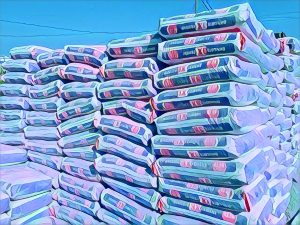
Nigeria’s government has warned that it may resort to importing cement if the local manufacturers do not lower the price of the product in the country. The Minister of Housing and Urban Development, Ahmed Dangiwa, issued the warning on Tuesday at an emergency meeting with cement and building materials manufacturers in Abuja.
The meeting was convened to address the soaring price of cement in the past few weeks, which has risen from about N5000 ($12.5) to N10,000 ($25) per 50kg bag. The minister expressed his concern that the price hike was affecting the housing delivery and the economic recovery of the country, especially in the wake of the COVID-19 pandemic and the oil price slump.
Dangiwa said the government had taken several steps to support the cement industry and protect it from foreign competition, such as banning the importation of cement, granting tax incentives, and providing infrastructure. He said the government expected the manufacturers to reciprocate by reducing the price of cement and making it affordable for Nigerians.
He dismissed the reasons given by the manufacturers for the price increase, such as the high cost of gas, the depreciation of the naira, and the importation of equipment. He said these factors were not enough to justify the astronomical pricing of cement, which he described as unreasonable and unacceptable.
He also criticized the Cement Manufacturers Association of Nigeria (CEMAN) for failing to regulate the price of cement and allowing some of its members to exploit the market situation. He said the association should not just be a platform for lobbying the government, but also for ensuring fair and ethical practices in the industry.
He said the government would not hesitate to open the borders for cement importation if the manufacturers did not comply with the government’s directive to reduce the price of cement. He said this would create competition and force the local manufacturers to lower their prices or lose their market share.
He said the government was committed to ensuring a stable and transparent cement market that would benefit the consumers, the investors, and the economy. He said the government would also continue to monitor the activities of the manufacturers and other stakeholders in the industry to prevent any form of malpractice or sabotage.
He urged the manufacturers to cooperate with the government and show patriotism and social responsibility in their operations. He said the government and the manufacturers had a common goal of providing quality and affordable housing for Nigerians and creating employment and wealth for the nation.
The meeting was attended by representatives of the major cement manufacturers in the country, such as Dangote Cement, Lafarge Africa, BUA Cement, and Ibeto Cement. The manufacturers agreed to review their prices and report back to the minister within a week.
The cement industry is one of the key sectors of the Nigerian economy, contributing about 1.5 percent to the gross domestic product (GDP) and employing over 2 million people. The industry has a production capacity of about 45 million metric tons per annum, which is expected to increase to 53 million metric tons by 2025.
As Nigeria prepares for the 2024 general elections, many citizens are hoping that the government will address the challenges facing the economy, such as inflation, unemployment, insecurity, and corruption. They are also hoping that the government will uphold the rule of law and the democratic process, and avoid any actions that could endanger the peace and unity of the country.
Source: Tribune Online


